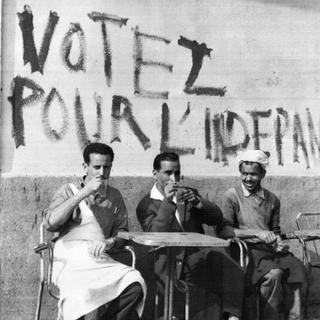


Between France and Algeria, an enduring cycle of conflict
In DepthAlgiers and Paris are in conflict once again, for the third time in three years, highlighting the recurring turbulence in the relationship between the two countries.
It was a strange crisis. Everyone knew what was going on, the storm that was brewing, but nobody let on. Not on June 13, in sunny Bari, Italy, during an ostensibly warm exchange between French President Emmanuel Macron and his Algerian counterpart Abdelmadjid Tebboune on the sidelines of the G7 summit. Nor on July 14, in Algiers, at the heights of El-Biar, in the garden of the Villa des Oliviers, the French ambassador's residence with a breathtaking view over the bay. There, the host, Stéphane Romatet, praised the "unique closeness" and "unparalleled density" of relations with Algeria before an audience of guests. Flanked by two ministers and several high-ranking Algerian officials, Romatet added that "the destinies of our two countries are intimately linked" and that "we need each other" in the face of the crises (security, climate, migration) affecting the region.
Appearances were maintained and effusions preserved right up to the last moment, despite the knowledge and plan of an imminent strategic shift by the French that was against Algeria's interests. On July 30, Macron sent a letter to the king of Morocco, Mohammed VI, solemnly confirming France's support for Moroccan sovereignty over the Western Sahara. In the eyes of Paris, the Moroccan autonomy plan from 2007 is now the only valid starting point for discussions aimed at finding a political solution in this disputed territory.
For better or worse (depending on one's point of view), Macron stated in his letter that the "present and future" of the former Spanish colony – which Rabat took control of in 1975 to the great displeasure of Algiers, which supports the pro-independence Sahrawi Polisario Front movement – "fall within the framework of Moroccan sovereignty." The pro-Moroccan change in position is significant, even though France still refers to UN Security Council resolutions, which provide for the highly theoretical possibility of a referendum on self-determination. Previously, Paris considered the Moroccan autonomy plan as "a serious and credible basis," but nothing more. Now, "a basis" has become "the only basis": a substantial leap.
In Rabat, where the king had been giving Macron the cold shoulder for the past three years, the French endorsement was immediately celebrated. The French-Moroccan relationship can now return to its fundamentals, which is a historic connivance that had grown strained over time, particularly with the demise of the Jacques Chirac generation. In Algiers, anger erupted. The Ministry of Foreign Affairs, which had always hoped to free itself from the dilemma of a "zero-sum game" in North Africa by improving relations with Morocco without cooling down those with Algeria, had to come to terms with it. The breakdown in relations in the summer 2021 between the two North African fraternal enemies, stemming from the end of the ceasefire in Western Sahara in November 2020 and the normalization of ties between Morocco and Israel the following month, makes France's attempts at balance increasingly precarious.
You have 85.05% of this article left to read. The rest is for subscribers only.
